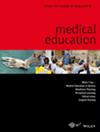Although disability inclusion in medical education is gaining interest internationally, scholarship and policy recommendations on this topic largely hail from the US, Canada, Australia and the UK. Existing scholarship, while calling for medical education to enact cultural and attitudinal change related to disability, has yet to exemplify how educators might critically examine their understandings.
As two medical educators and researchers, one based in New Zealand and the other based in Saudi Arabia, we took a duoethnographic approach to explore tensions, possibilities and assumptions regarding disability and disability inclusion in medical education. Through a year-long synchronous and asynchronous dialogue, we examined our experiences in relation to literature from critical disability studies and disability inclusion in medical education.
We present recurrent themes from our dialogue. We consider what disability means, explore definitions and models of disability in our contexts, as well as our lived curriculum of disability. We grapple with the applicability of disability inclusion practices across borders. We explore the complexity of supporting access without a clear roadmap, while recognising educators' potential in this work. Finally, we recognise that, if disability is relational, we have the power and responsibility to address ableism in medical education. Throughout, we return to the importance of local consultation with disabled people (learners, physicians) to better understand how services ought to be oriented.
Duoethnographic dialogue is a fruitful approach to critically examine understandings of disability with others and represents a necessary start to work in education that seeks to advance justice. We share possible actions to take the work forward beyond dialogue and suggest that readers engage in such dialogues with others in their own contexts.


